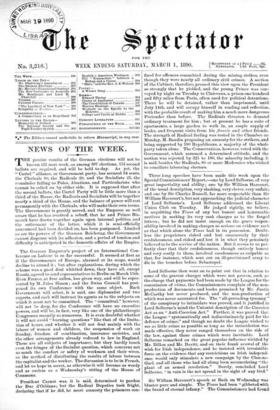Lord Selborne then went on to point out that in
relation to some of the gravest charges which were not proven, such as the charge that payments had been made by the League for the commission of crime, the Commissioners complain of the non- production of documents and books promised by Mr. Justin McCarthy but never produced, and the non-production of which was never accounted for. The "all-pervading tyranny" of the conspiracy to intimidate was proved, and it justified in Lord Selborne's mind the Unionist description of the Coercion Act as an "Anti-Coercion Act." Further, it was proved that the League "systematically and indiscriminately paid for the defence of crime," and though no doubt the League wished to see as little crime as possible so long as the intimidation was made effective, they never ranged themselves on the side of the law, against those crimes which were inevitable. Lord Selborne remarked on the great popular influence wielded by Mr. Dillon and Mr. Davitt, and on their frank avowal of the wish for Irish independence, and he insisted with irresistible force on the evidence that any restrictions on Irish independ- ence would only stimulate a new campaign by the Clan-na- Gael, and all those who had all along been accumulating "the plant of an armed revolution." Surely, concluded Lord Selborne, "in vain is the net spread in the sight of any bird."






































